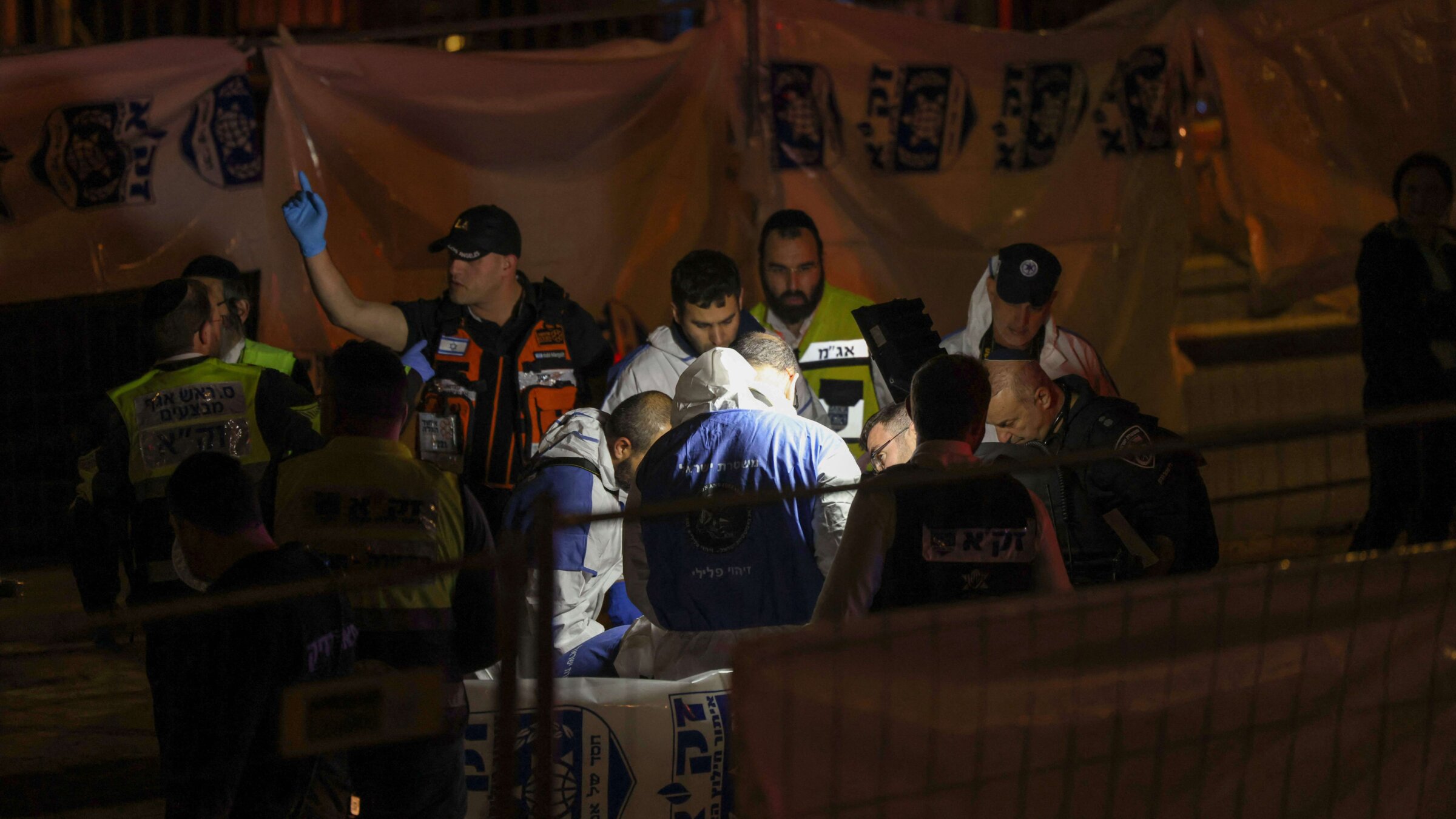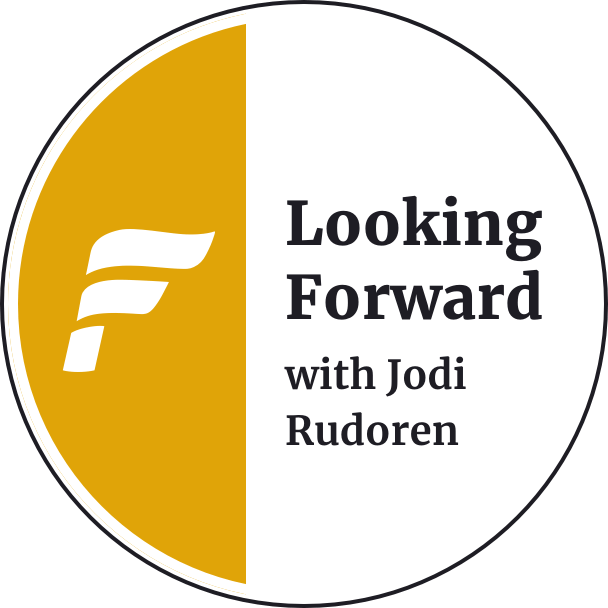Looking ForwardWhen all you can do about Israeli and Palestinian violence is scream ‘Enough!’ in any language
We’ve seen this horror movie before. The problem is not that it always has the same ending — it’s that it never ends.

Israeli personnel work at the site of a reported attack in East Jerusalem. Photo by RONALDO SCHEMIDT/AFP via Getty Images
There are these words that Israeli Jews and Palestinians share, words they repeat so much they’re almost like punctuation, words that fit seamlessly into both conversational Hebrew and Arabic — and just as well sprinkled, like a dash of local seasoning, into English conversations with Americans like me.
When I lived in Jerusalem, these words became part of my vernacular, too. I’ve missed them in the seven years since I returned to the U.S., because they each have a distinct flavor that their translations don’t quite convey.
There’s yalla, which means “let’s go,” and embodies the particular urgency and energy that pulses through the region. There’s sababa, “awesome” which can also express simple assent, like OK, no problem. There’s dugri: straight talk, bluntness, the bottom line.
And there’s khalas — enough, I’m done.
That’s what I want to scream right now, as I absorb the horrific news that a Palestinian gunman killed at least seven Israelis as they left Kabbalat Shabbat services in an East Jerusalem neighborhood Friday night, a day after Israeli soldiers shot dead nine Palestinians during a raid on the Jenin refugee camp.
I know that as the editor-in-chief of the nation’s leading Jewish news organization I am meant to have something profound to say about these tragedies. I understand that, after nearly four years as Jerusalem bureau chief of The New York Times, people expect me to offer some insight into the cycles of violence — some analysis or explanation, some hint of what might happen next.
But all I can think is khalas. Enough death, enough hate, enough guns, enough statements of sorrow from abroad, enough videos of outrage on social media, enough settlers chanting “Death to Arabs,” enough Gaza celebrations passing sweets in the streets — enough, khalas, enough.
And yet: I have to write this column. So I think back to the deadly attack on a synagogue in Jerusalem that I covered in 2014.
It was in Har Nof, a Haredi neighborhood in the west side of the city. (Friday’s was in Neve Yaakov, a settlement in the east — the part Israel seized in 1967 and later annexed, in a move the U.N. said was against international law; the part Palestinians see as their future capital.)
Back then, two men with a gun, knives and an axe burst into the shul on a Tuesday morning, killing three rabbis and another man, whose blood pooled onto their prayer shawls and books, and later a police officer. On Friday, a lone gunman shot up the street outside a synagogue as worshippers prepared to walk home, killing five men and two women, ages 20 to 70.
I think, too, of the time I spent in Jenin, one of the first Palestinian cities in the occupied West Bank that I visited upon arriving as a Times correspondent in the spring of 2012. I went in the wake of the death of Qadoura Moussa, the 60-year-old governor of the area, who suffered two heart attacks roaming the city with a rifle an hour after a Palestinian shot up his hilltop home.
Moussa’s wife told me she was fetching the two of them ice cream from the kitchen when the barrage of bullets hit the stone house — the same house where her husband was born, where they’d been married 31 years earlier, where they raised three sons and a daughter. His children talked about how he loved to lounge on the red-and-black couches in the glass-enclosed rooms on the house’s roof, where on a clear day you could see all the way to Haifa, where his family lived before Israel’s establishment in 1948.
I wrote again about Jenin the next year, when Israeli troops killed a 22-year-old Palestinian man during a raid on the Jenin refugee camp aimed at arresting a member of the Palestinian Islamic Jihad — and again in 2014, when Israeli forces killed three Palestinians and wounded seven in a raid on the Jenin refugee camp seeking to arrest suspected militants.
That’s the very same refugee camp a new generation of Israeli soldiers raided early Thursday morning to arrest, yes, Islamic Jihad militants. They ended up killing nine people, including two teenage boys and a 60-year-old woman.
Jenin, the site of a deadly 10-day battle between Israeli troops and Palestinian militants during the second intifada in 2002. Jenin, where Juliano Mer Khamis, the son of a Jewish mother and Palestinian Christian father, made the 2004 documentary Arna’s Children, in which he returned to the refugee camp to track down the kids who’d acted in the theater program his mother ran in the 1990s — and found they were hardened fighters, imprisoned or dead.
Jenin, where Mer Khamis went on to create the Freedom Theatre in 2006 — and to be murdered by masked gunmen, presumably Palestinian militants, five years later. Jenin, where the Palestinian-American journalist Shireen Abu Akleh was killed last year covering yet another Israeli raid on the refugee camp. Jenin, the West Bank headquarters of the Palestinian terror cell featured in the new season of Fauda.
Khalas.
As the word echoed in my head Friday afternoon, I called my friend Libby Lenkinski, who works at the New Israel Fund, and is the best person I know at not just analyzing the conflict, but grappling with our emotions around it.
After the 2021 Israel-Gaza war, Libby and I partnered on a series of events called “Israel Therapy,” a concept she invented that will soon become a podcast with Libby as therapist-in-chief. On Friday afternoon, she was thinking about how the eruption of violence shattered the illusion of unity shown in recent weeks at mass protests against Israel’s new far-right government in Tel Aviv, Jerusalem and Haifa.
“There are these corners of plausible deniability that we get into as liberal Israelis, liberal Jews, liberal Arabs, liberal Palestinians, and then violence is the thing that pulls those things out from behind the curtain,” Libby explained. “There’s unity in opposition. But we may not agree about what we want as the future here, and then violence is the thing that comes in to drive that point into the center of the focus.”
We have seen this horror movie so many times, and it just gets more difficult to watch. It’s not that the narrative always has the same ending. It’s that it never ends. Khalas.
I heard someone on NPR ask Friday afternoon whether U.S. Secretary of State Anthony Blinken, who is headed to the region this weekend, could do anything to restore calm. No, is the short answer.
I read that Israeli Prime Minister Benjamin Netanyahu has promised to respond. Israel will probably bulldoze the home of the family of the man responsible for the attack, erect new checkpoints in Arab neighborhoods of Jerusalem. If the gunman is found to have ties to Hamas, which rules Gaza, or another militant group, Israel may bomb terror sites in the strip. Or make another arrest raid in Jenin. Khalas.
Will this spark a third intifada? Probably not, given both the vacuum in Palestinian leadership and the intense PTSD from the second intifada that still blankets both sides. But it will certainly spawn many articles asking that ineffable, unanswerable question.
Some Palestinians will justify Friday’s synagogue attack as a response to Thursday’s killings in Jenin. Some Israelis will excuse Jenin because of intelligence reports that suggested militants there were planning an imminent terror attack. That attack would have been a response to some offense by Israel, which could be traced back to some wrongdoing by Palestinians, which was predicated on something before it that was spawned by something before that, and so on until you get back to 1967 and 1948.
And further still, to the beginning, to Genesis: Abraham had two sons; there was Isaac, and there was Ishmael.
Khalas, their descendants are screaming. Enough.
A message from our Publisher & CEO Rachel Fishman Feddersen

I hope you appreciated this article. Before you go, I’d like to ask you to please support the Forward’s award-winning, nonprofit journalism so that we can be prepared for whatever news 2025 brings.
At a time when other newsrooms are closing or cutting back, the Forward has removed its paywall and invested additional resources to report on the ground from Israel and around the U.S. on the impact of the war, rising antisemitism and polarized discourse.
Readers like you make it all possible. Support our work by becoming a Forward Member and connect with our journalism and your community.
— Rachel Fishman Feddersen, Publisher and CEO





























